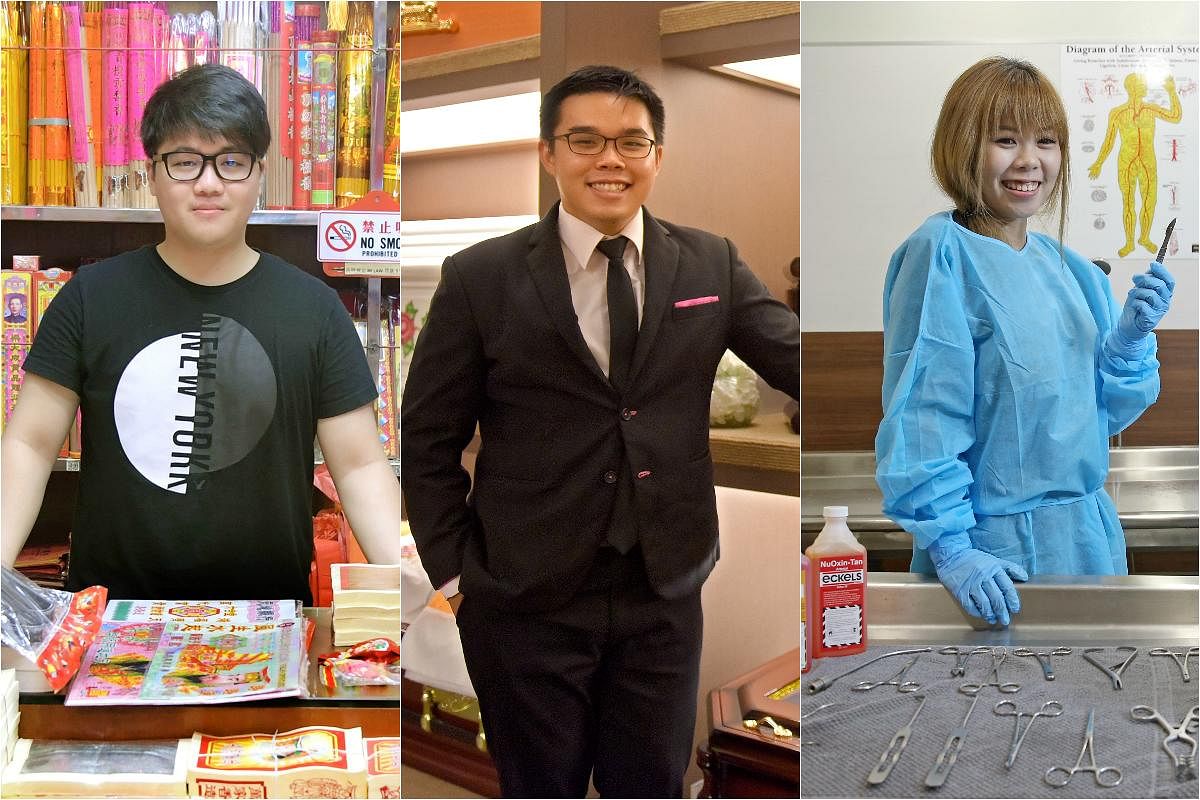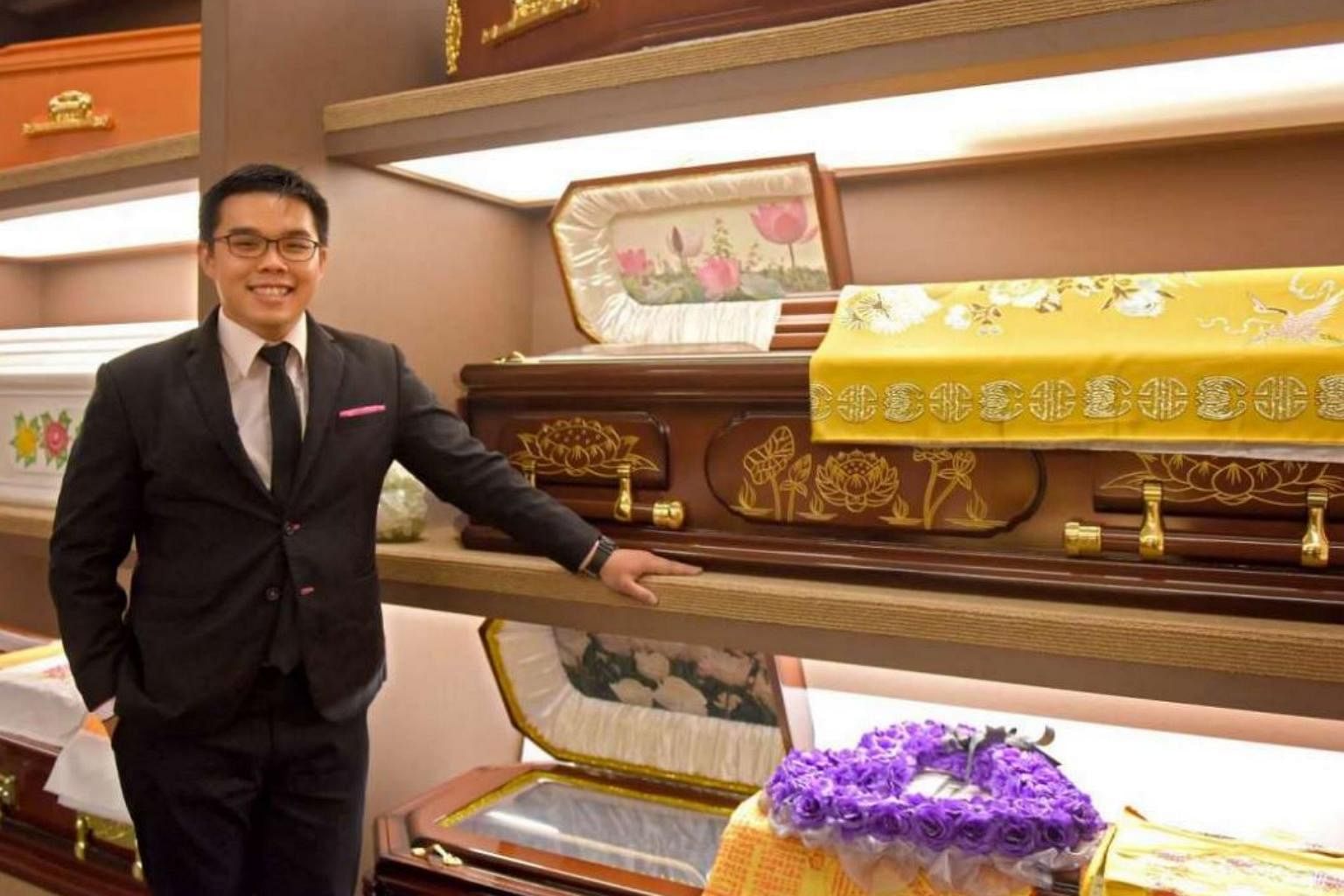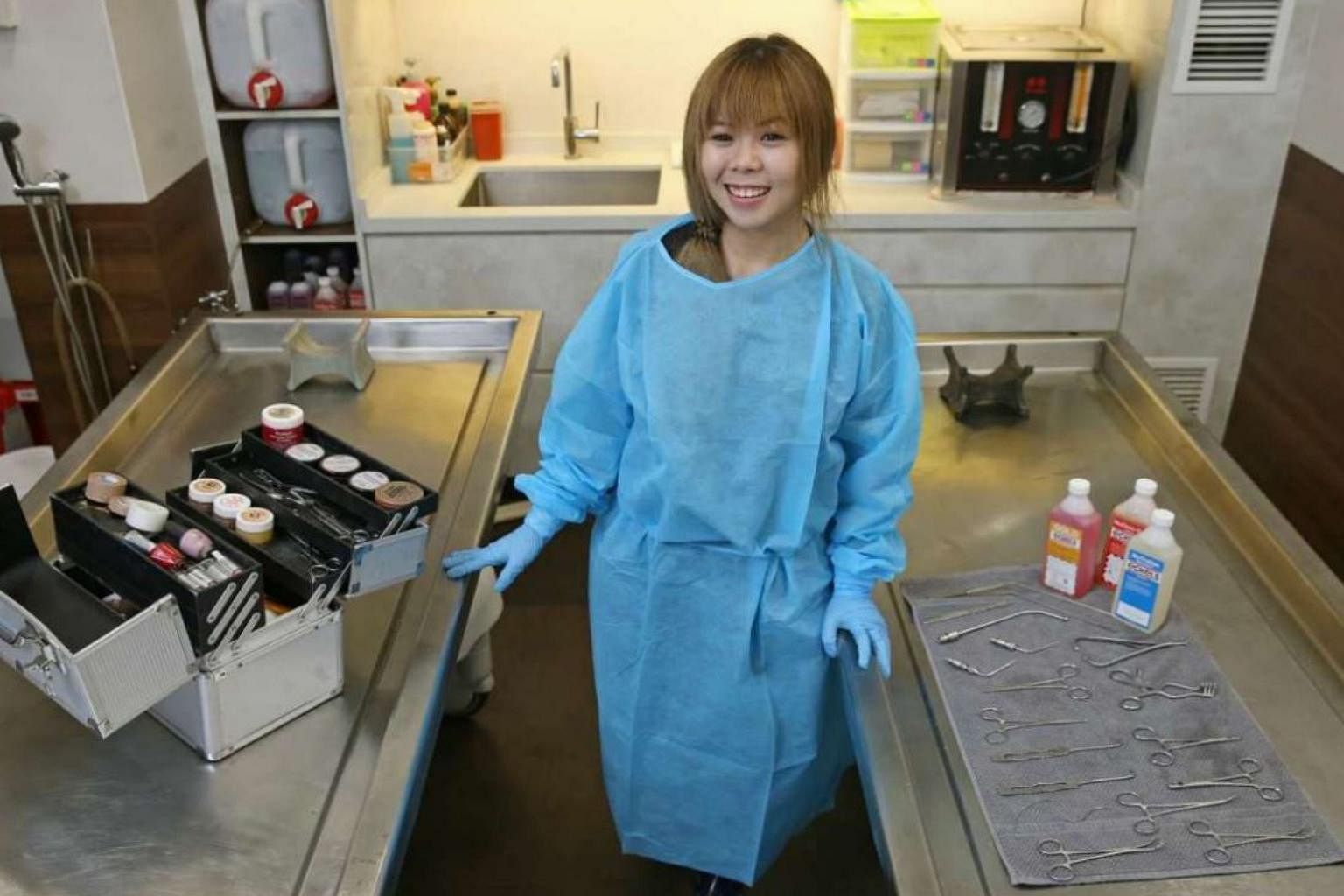Looking death in the face: Millennials in the funeral business
The undertaker industry is getting a boost as young people take up jobs associated with it

In 2009, at the age of 24 when he set up his funeral company, Serenity Casket and Funerals, Mr Elson Chong was one of the rare young men in the industry.
But the funeral director, who is 32 this year, is finding himself in younger company as more of his peers are beginning to hold jobs in what insiders call the "death care industry".
This refers to companies that offer services and products for funerals, cremation, burial and memorials. They may provide funeral arrangements and embalming services and sell a range of products from coffins to headstones to Chinese paper offerings.
There are sunrise and sunset industries, but the industry of death is one of the few bulletproof sectors.
But while the death care industry will never die, it has been greying. The people who work in such industries are typically older, having inherited the family trade, or are perceived as having no other choice than to work in what many consider to be a grim environment.
But the situation is changing, both as a result of the decreased stigma around death and its paraphernalia, as well as the tough job market.
As a result, the undertaker industry is getting new blood in the form of young entrepreneurial types such as Mr Chong.
There is also a spike in people under the age of 30 looking for jobs in funeral homes, say funeral service providers interviewed by The Sunday Times.
Job seekers apply for positions such as funeral directors, embalmers and pallbearers - where the pay scale may be comparable to corporate jobs for new employees with a diploma.
Mr Chong say she receives one to two job applications from those aged under 30 every month.
Direct Funeral Services and Ang Chin Moh Funeral Directors, two funeral firms that have been in the industry for decades, say over the past two years, they have received an average of two to three such applicants every month.
Five years ago, almost none of their applicants would have been that young.
The Life Celebrant, a funeral company founded in 2010, receives an average of eight queries from young individuals every month.
Ms Jenny Tay, 31, managing director of Direct Funeral Services and assistant secretary at the Association of Funeral Directors, says this is because younger people are becoming less superstitious and many are curious about the death care industry. The company was founded by Ms Tay's father and she took over the business in 2014.
"Death care is an essential service. It's good that they can see the professional side of it," she says.
Her company has rolled out a management trainee programme to help train and retain potential employees.
Social media has also helped draw the younger crowd into the industry. For example, The Life Celebrant's managing director Ang Jolie Mei, 36, says more of the younger generation have reached out to them after the company started promoting their services through Facebook.
Some have attributed this trend to the sluggish job economy.
Dr Mohamed Effendy, 39, a historian from the National University of Singapore's department of Southeast Asian Studies, says: "We are dealing with Singaporeans, after all. They are pragmatic. If they find that this line is thriving, they will choose it in spite of the stigma attached to it."
Although there is an interest from younger job seekers in the death care industry, he feels that the topics of death and dying are still taboo for most Singaporeans.
"We are at a stage where more information is coming in about the industry, but the stigma is still there," he says.
It does not just come from superstition - being associated with dead people is deemed "unlucky" in most Asian cultures - but may stem from old cultural norms, says Mr Khanthan Vithilingam, 28, funeral director of Singapore Indian Casket Services.
He founded the company with his uncle in 2013 - the duo had been working in other funeral companies before starting their own business.
"In the past, only those in the lower castes took up these jobs, so it's seen as a lower-level job," he says, referring to India's old hierarchical social system.
Unlike the rest, he sees only a handful of interested younger individuals every year.
However, other funeral companies have a rosier outlook on the industry's future.
Ms Deborah Andres, 56, group chief executive of Ang Chin Moh Funeral Directors, says: "As more of them join the industry, they can discuss the importance of their profession with their friends and help demystify dying, death and funerals."
Keeping the family brand going
Like most millennial entrepreneurs, 29-year-old Alex Teo has a Facebook page for his business.
But instead of marketing gadgets or apps, he sells and distributes paper offerings, incense and other Chinese religious goods.
"When I tell my friends what industry I'm in, they give me a puzzled look and say, 'You mean these businesses are still around?'" he says with a laugh.
He is the third-generation owner of Ban Kah Hiang Trading, a shop in Bukit Merah founded by his grandfather more than 50 years ago.
Mr Teo, who had worked as a medical claims assessor, did not think of carrying on his family's business until three years ago, when he noticed that his father, then 55, was ailing.
"There are a lot of established brands that have closed down because no one wants to take over them. I didn't want my grandfather's brand to disappear like that too. As my father's son, it's my responsibility to not let the brand disappear."
He has an older brother who works in a hotel as an engineering supervisor. His 55-year-old mother helps out in the shop on most days.
Since taking over last year, Mr Teo, who has a business management degree from the University of Manchester, has introduced new systems such as using computers to keep track of inventory.
While his youthful-looking face gives some customers pause, especially when they need help choosing items, he says most end up trusting him. It helps that he is a familiar face in the shop, having helped there since he was in primary school.
"Sometimes, they will ask if I'm sure. If they still doubt me, I'll ask my mother to reassure them."
However, he says working there can be lonely at times, especially as most of his customers and employees are decades older than him.
On what keeps him motivated, Mr Teo, who is married with a daughter, says: "I'm happy knowing that my parents can relax and enjoy their lives."
He gave up his dream of becoming a pilot

When funeral director Lyndon Leong, 25, decided to enter the funeral services industry, his disapproving parents laminated a recruitment letter from the army and stuck it on his bedroom door.
"They wanted to remind me of all the opportunities I had. I could have had a bright career in the army."
Admittedly, being a funeral director is not a common career aspiration for a 22-year-old officer then in national service.
But he went ahead and joined funeral company The Life Celebrant.
For the past 1 1/2 years, he has been organising funerals - handling logistics such as ordering flowers and preparing caskets.
In a sense, his job is similar to an event organiser's, except his projects are emotional occasions.
"It's not just about arranging a funeral. It's also about making it a safe environment for the family to be in, to grieve and to spend time with their loved ones," he says.
The idea of working in this trade first struck him when he attended the funeral of his friend's grandmother, which coincided with a period of job-searching for him.
The aerospace engineering diploma-holder had shelved his original dream of becoming a pilot after he realised he would be frequently away from his family.
"I thought to myself, 'Why not the funeral industry?' Not many have entered it, so I'd be one of the few young ones who are crazy enough to do it."
Despite objections from his family, the headstrong bachelor went ahead with his plans after completing NS.
His parents - a retiree father and a dental assistant mother - have since warmed to the idea. He has two older sisters.
Friends who have expressed doubts about his career choice have been won over, he says.
"I make them see my point of view. Someone has to take care of you when you die," he says.
"You have gynaecologists who bring you into this world, so why shun professionals who take you out of it?"
At 22, she has handled more than 500 bodies

It is the hardest when it is someone you know. That has been the experience of Ms Nicole Chong, 22, one of Singapore's youngest embalmers.
To be more specific, she is an embalmer-in-training, as she has not been officially certified yet. But that has not stopped her from handling more than 500 bodies under the supervision of a more experienced embalmer, in her three years as a trainee in the profession.
She works at her brother's business, the eight-year-old funeral company Serenity Casket and Funerals.
The toughest case she handled was that of her colleague, hearse driver Lim Swee Huat, who died of a heart attack in 2015 at the age of 62.
On the afternoon before he died, he had driven her to McDonald's for lunch. That very night, he was on the embalming table.
Embalming is the process of preserving the deceased with chemicals for various purposes. For funerals, it is so that the bodies have a more life-like appearance.
Ms Chong has no formal training in the field - she holds a diploma in general studies from private institute Kaplan. Instead, she picked up the skills on the job under the guidance of her sister-in-law, Ms Sarah Ang, 32, who received her certification in embalming from New Zealand's Wellington Institute of Technology.
Her brother, Mr Elson Chong, 32, is the company's founder. His wife, Ms Ang, was the one who got Ms Chong interested in the job.
Ms Chong's parents own their own funeral home.
Ms Chong picked up skills such as manoeuvring and draining blood from a body from her sister-in-law. Eventually, she hopes to go to New Zealand to get a certificate in embalming.
While she is passionate about her job, her social circle may not be as open-minded. Friends who are "slightly more superstitious won't want to talk about my job".
"But I'll try to share my interest with them," she says.
Join ST's Telegram channel and get the latest breaking news delivered to you.
A version of this article appeared in the print edition of The Sunday Times on April 02, 2017, with the headline Looking death in the face: Millennials in the funeral business. Subscribe

